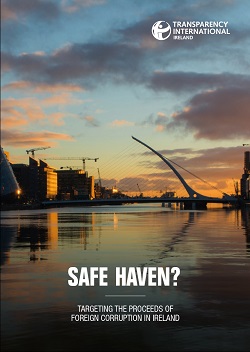One of TI Ireland’s strategic priorities is ‘ending the use of Ireland as a safe haven for the world’s dirty money’. We work towards this objective by seeking to close legal loopholes and address regulatory deficiencies that enable the proceeds of overseas corruption and transnational organised crime to be laundered through Ireland’s financial system.
Wherever possible we adopt a collaborative approach to this work, bringing our own or TI’s global expertise to augment the efforts of others working against illicit finance – whether in government, law enforcement, the private sector or civil society.
TI Ireland’s work on tackling dirty money is funded by the Global Anti-Corruption Consortium and the European Commission, in partnership with the TI Secretariat and a number of other TI national chapters across the EU.
This webpage provides links to a range of resources on dirty money that TI Ireland has published or contributed to, including:
News
21 March 2024
Illicit Finance: Implications for National Security and the Need for a New Strategic Response
30 November 2023
‘Follow the money’ … But how far? Tackling transnational illicit financial flows through Ireland
25 November 2022
Transparency International Ireland calls on Government to maintain civil society access to Register of Beneficial Ownership
4 October 2022
Corporate Ownership Transparency and Anti-Money Laundering Training
23 February 2021
Report finds much to be done to stop Ireland becoming a ‘Safe Haven’ for the world’s dirty money
Reports
‘Safe Haven?’ Targeting the Proceeds of Foreign Corruption in Ireland
 TI Ireland's ‘‘Safe Haven?’ Targeting the Proceeds of Foreign Corruption in Ireland’ report highlights the risk that the proceeds of international corruption are being laundered through Irish-based financial services and companies. Those risks include the use of Special Purpose Vehicles (SPVs) such as ‘Section 110 companies’ used to avoid tax on investments, as well as Ireland’s Immigrant Investor ‘Golden Visa’ Programme which allows wealthy non-EEA nationals to secure residency visas in return for at least €1 million investment in government approved schemes or a €500,000 donation to charity. TI Ireland also raised concerns about the potential use of new investment liability partnerships which do not currently have to file beneficial ownership details with the RBO.
TI Ireland's ‘‘Safe Haven?’ Targeting the Proceeds of Foreign Corruption in Ireland’ report highlights the risk that the proceeds of international corruption are being laundered through Irish-based financial services and companies. Those risks include the use of Special Purpose Vehicles (SPVs) such as ‘Section 110 companies’ used to avoid tax on investments, as well as Ireland’s Immigrant Investor ‘Golden Visa’ Programme which allows wealthy non-EEA nationals to secure residency visas in return for at least €1 million investment in government approved schemes or a €500,000 donation to charity. TI Ireland also raised concerns about the potential use of new investment liability partnerships which do not currently have to file beneficial ownership details with the RBO.
The report notes that the Irish property market has substantially increased in value in recent years, which can promise a solid short-to-medium term investment for anyone looking to launder money. Although there is little evidence to suggest that Dublin has become a home for the world’s oligarchs in the same way as other major capitals, the report states the controls around the sector leave some room for concern, especially given the low level of anti-money laundering compliance by property service providers such as real estate agents. The risk that Irish company formation agents, lawyers and accountants are acting as ‘gatekeepers’ or ‘professional enablers’ on behalf of organised crime groups and corrupt individuals is highlighted as well. The report also deals with the mechanisms by which the proceeds of corruption is seized and repatriated to the victim country by the Irish authorities.
Recommendations
TI Ireland’s 18 recommendations to stem the tide of dirty money into the country, include the development of a national strategy against corruption and related money laundering offences; the establishment of a unified National Anti-Corruption Bureau and anti-money laundering supervisory authority for Designated Non-Financial Businesses and Professions (DNFBPs); as well as the prohibition of continued sale of dormant shelf companies in Ireland; and the requirement that legal persons acting as beneficiaries of life insurance policies become a heightened risk factor for relevant firms’ anti-money risk assessments. In the meantime, TI Ireland has called for additional resourcing of Ireland’s law enforcement and regulatory agencies including the Garda National Economic Crime Bureau.
Submissions
19 April 2024
Letter to Minister for Finance on access to beneficial ownership information
8 March 2024
Submission on Transparency and Registration of Limited Partnerships
15 January 2024
Submission to Rule of Law Report on Ireland 2024
24 January 2023
Submission to Rule of Law Report on Ireland 2023
13 April 2021
Letter to Minister Helen McEntee on Repatriation of Assets
Media Mentions
7 May 2024
Reforms to secretive limited partnership structures taking ‘too long’ - transparency body
25 April 2024
EU reprimand over Ireland’s ‘lackadaisical’ dirty money policy ‘unsurprising’
23 February 2024
‘Pressure mounts on ‘extreme’ rules keeping ownership of some companies shrouded in secrecy’, The Journal.ie.
18 February 2024
‘How credible is Ireland’s bid for the EU’s anti-money laundering agency?’, Business Post.
4 February 2024
‘Finance Minister Michael McGrath to re-examine law blocking transparency’, Irish Independent.
30 January 2024
‘Corruption is a growing problem in Europe, according to Transparency International’, EuroNews.
28 January 2024
‘Analysis: How a ‘comical’ new law makes it impossible to find out who owns what’, Business Post.
27 September 2023
‘Corruption is one of the key enablers of any form of organised crime’, The Tonight Show, Virgin Media TV.

